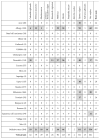Beneficial Role of Phytochemicals on Oxidative Stress and Age-Related Diseases
- PMID: 31080832
- PMCID: PMC6475554
- DOI: 10.1155/2019/8748253
Beneficial Role of Phytochemicals on Oxidative Stress and Age-Related Diseases
Abstract
Aging is related to a number of functional and morphological changes leading to progressive decline of the biological functions of an organism. Reactive Oxygen Species (ROS), released by several endogenous and exogenous processes, may cause important oxidative damage to DNA, proteins, and lipids, leading to important cellular dysfunctions. The imbalance between ROS production and antioxidant defenses brings to oxidative stress conditions and, related to accumulation of ROS, aging-associated diseases. The purpose of this review is to provide an overview of the most relevant data reported in literature on the natural compounds, mainly phytochemicals, with antioxidant activity and their potential protective effects on age-related diseases such as metabolic syndrome, diabetes, cardiovascular disease, cancer, neurodegenerative disease, and chronic inflammation, and possibly lower side effects, when compared to other drugs.
Figures




References
Publication types
MeSH terms
Substances
LinkOut - more resources
Full Text Sources
Medical

